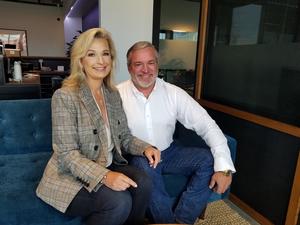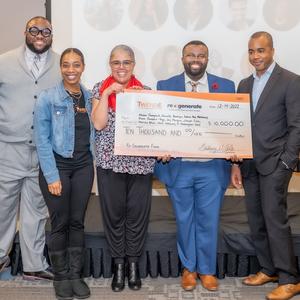
No one wants cold, hard french fries, but with the rise of delivery apps, home-diners are often handed less-than-fresh potatoes.
In fact, stale spuds have grown into a $87 billion industry, according to Justin Gray, who says he has a product that will keep your taters toasty.
“The name of my company is Fryy.AI and it has dot A.I. [in the name] because I want to be able to raise more money,” Gray said during a recent startup pitch event. “My invention is a small air fryer that you pay an extra 50 cents per order to get your fries delivered in, so they show up hot and crispy 100% of the time. … When [the air fryer] shows up to your house it's also got a microphone and speaker in it so we can listen to you and then we sell your data back to french fry conglomerates. … Once you have it in your house for a month, it learns what your fry preferences are and it can automatically start ordering more french fries for you.”
If Fryy.AI sounds too good to be true, that’s because it was part of NashTech’s Faux Pitch Night, held at Vaco’s Brentwood offices earlier this year.
In reality, Gray is the co-founder of Nashville-based party planning app Potluck Inc. and cold french fries are not an $87 billion industry.
Faux Pitch Night participants were given two minutes each to pitch a made up company, with the goal of making it as impractical and silly as possible. About 50 people attended the event, which featured a half-dozen pitches.
Real pitch competitions have gained popularity in recent years, with the Nashville Entrepreneur Center, Lipscomb University, Launch Tennessee and others regularly holding events locally. Typically, founders tell a panel of judges about their startup and why it is investable, with the goal of winning a financial prize at the end the competition.
Of course, founders are almost constantly pitching their business outside of competitions, whether it be to investors, prospective clients or new acquaintances. Since 2017, $4.1 billion has been invested in Tennessee startups, according to The State of Startups in the Southeast 2022 report.
NashTech founder Haley Zapolski said the point of pitching fake companies is to get founders out of their comfort zone, while improving pitching skills and having fun. This was the second time NashTech has held a faux pitch event.
“A lot of networking events can feel a bit stale and at this networking event I wanted people to really buy into putting themselves out there and be willing to be absurd, as a way to better connect with others,” Zapolski said. “I don’t know if they’re going to learn business principles but I do believe there is something to learn about showmanship, timing and audience reaction. The funniest companies are the ones that are thought-out like they were a real company. … They’re realistic but absurd.”
Zapolski, who previously held positions at the Nashville Entrepreneur Center and JumpStart Foundry, said that when pitching a real company, the founder should sell the investment opportunity, not the product. She also said it’s critical that founders understand the problem their company is solving and the market they want to reach.
Maybe most importantly, Zapolski said the person pitching should “be a good story teller.”
Even when what's at stake is small potatoes.








